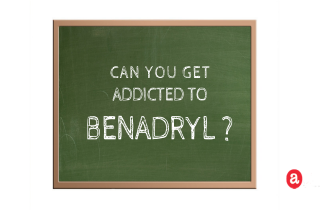Sometimes. If you are taking Benadryl as prescribed, your chances of becoming addicted to the active ingredients found in the antihistamine are relatively low. But if you are taking Benadryl for euphoric effect, risk of Benadryl addiction increases. We review here.
Benadryl chemistry and use
Benadryl is an antihistamine used for the temporary relief of allergy symptoms, motion sickness and in the treatment of Parkinson’s Disease. However, the active ingredient in Benadryl (diphenhydramine) can also affect the central nervous system and has been used medically as a sleep aid and a cough suppressant. Non-medically, people may seek the significant sedative side effects of the drug and abuse Benadryl for euphoric effect. In other words, many over the counter and Rx drugs do not have euphoric effect. For example, getting high on ibuprofen and taking trazodone to get high is impossible. But Benadryl is different. Some people can feel high on Benadryl.
What does Benadryl do in the body?
Diphenhydramine is a H1 receptor antagonist, which works by blocking the effect of histamine in the body and results in relief from allergy symptoms. However, the chemical reactions that diphenhydramine trigger in the body may also other effects, including significant sedative side effects on the central nervous system. The effects of Benadryl are dose dependent and peak plasma concentrations of diphenhydramine occur 2-3 hours after ingestion. The effects of Benadryl usually last 4-6 hours. Benadryl central nervous system effects include:
- abnormal sensations (“pins and needles”)
- blurred vision
- confusion
- convulsions
- disturbed coordination
- dizziness
- euphoria
- excitation
- fatigue
- inflammation of a peripheral nerve or nerves
- insomnia
- irritability
- nervousness
- restlessness
- sedation
- sleepiness
- tinnitus
- tremor
- vertigo
Mixing Benadryl with other substances
Benadryl is known to have adverse reactions when mixed with other medications or substances. Effects of diphenhydramine are increased by the presence of MAOI’s, diazepam, hypnotics, sedatives, tranquilizers, and other central nervous system depressants. Like other drugs, mixing diphenhydramine with alcohol can be dangerous and should be avoided (can you mix Adderall and alcohol?). If you take Benadryl and drink alcohol, the sleepy, drowsy, or lightheaded sensations of alcohol may be amplified…but you are at increased risk for overdose on Benadryl and can cause serious harm to yourself and others.
How do you get addicted to Benadryl?
It is rare that people who take Benadryl as prescribed report dependence or withdrawal effects within recommended doses (25-50 mg diphenhydramine every 6-8 hours, not to exceed 50-100 mg every 4-6 hours.). But you should know if you take Benadryl repeatedly, or at higher than recommended doses. over time you can develop a physical tolerance to diphenhydramine. In other words, you will need to take more Benadryl to achieve the same effects. But physical dependence is not the same as addiction.
If you are taking Benadryl for the central nervous system effects of sedation or euphoria, you may also develop psychological dependence on diphenhydramine. Psychological dependence on drugs is a mental obsession with your drug of choice, and craving the drug even though taking it does you harm. So, Benadryl addiction occurs when your body both develops tolerance for diphenhydramine, you go through withdrawal when you stop taking it, AND you crave Benadryl despite negative consequences drug use has brought in your life.
Questions about Benadryl dependency
If you think that you may have a problem with Benadryl, you probably do. Please leave your question about Benadryl use or possible dependency below. We’ll be happy to help or to refer you to a local organization who can.









Related Posts